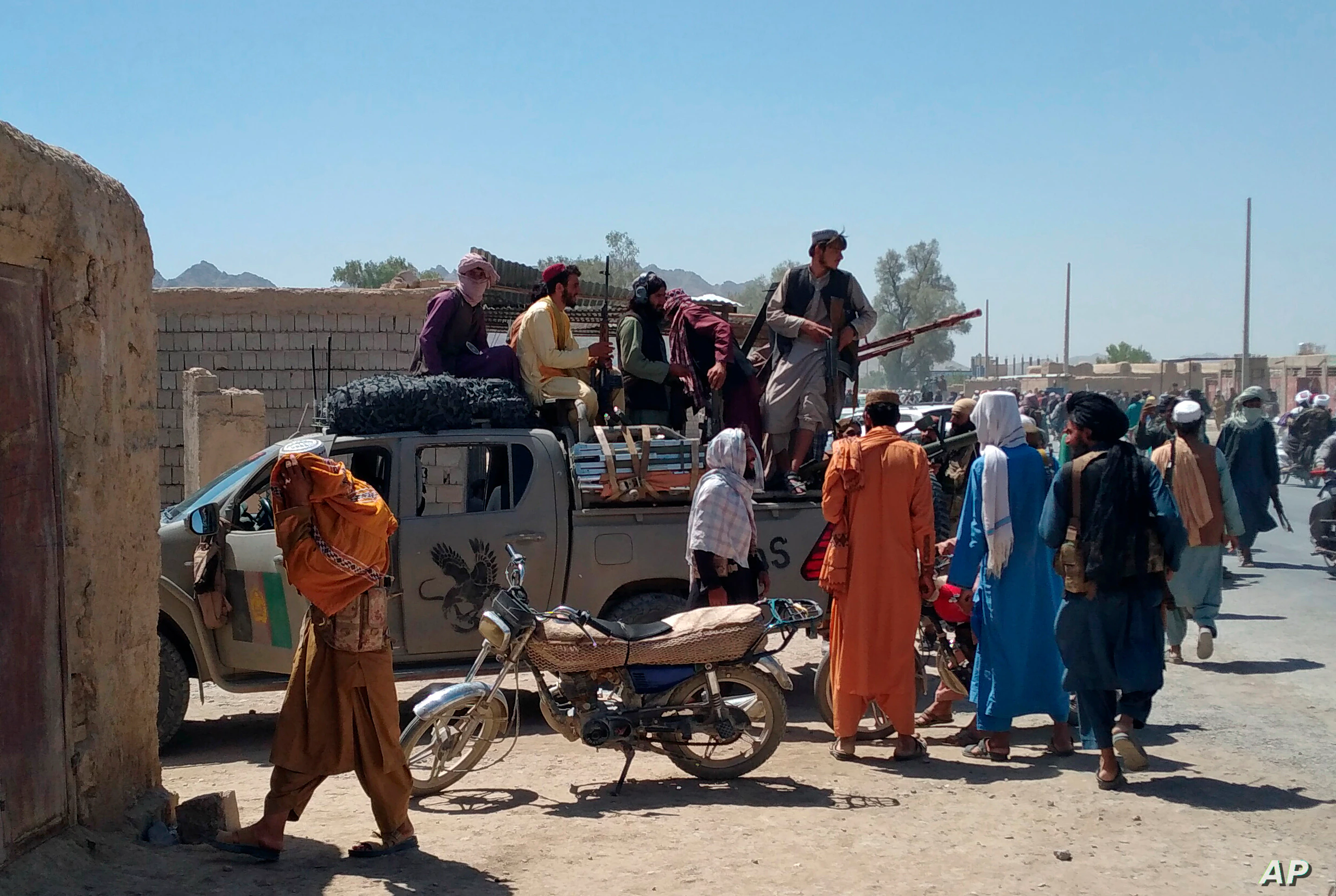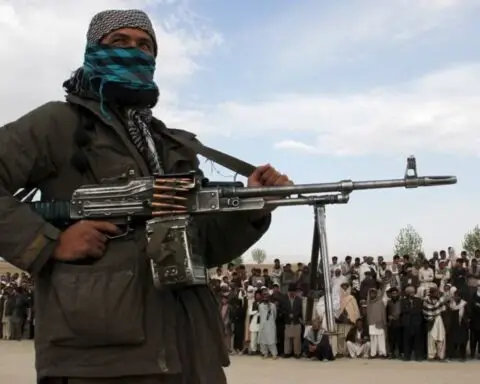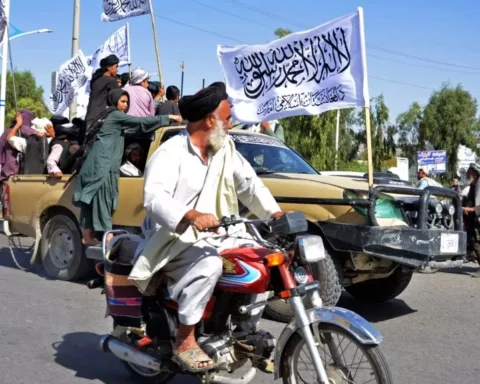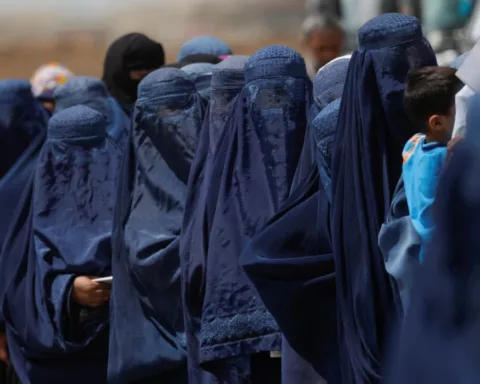ISLAMABAD – The stunning victories have brought the Islamist insurgents a step closer to the national capital, Kabul, where beleaguered Afghan President Ashraf Ghani’s government would not respond to media queries about the battlefield status.
Taliban spokesperson Zabihullah Mujahid said in a statement issued Friday morning their latest advances have established insurgent control over 14 of Afghanistan’s 34 provinces during the past week.
Mujahid warned the Taliban were determined to push ahead with their offensives to take control of all the provinces, urging Afghan security forces in the remaining areas to “end resistance and not risk their lives.”
Kandahar, Afghanistan’s second-largest city, had been under Taliban attacks for days.
Taliban spokesperson Qari Yousuf Ahmadi, who speaks for insurgent operations in southern Afghanistan, claimed Friday that Lashkar Gah, the capital of Helmand province in the south had also fallen under Taliban control. Afghan officials did not immediately comment on the fall of Lashkar Gah, as has been the case for other battlefield losses over the past couple of days.
Afghan government security forces have struggled to contain stunning weeklong insurgent advances.
U.S. Secretary of State Antony Blinken and Secretary of Defense Lloyd Austin spoke with Ghani to inform him that Washington was reducing its civilian footprint in Kabul in light of the evolving security situation.
“Secretary Blinken affirmed that the United States remained committed to support a political solution to the conflict,” said a post-conversation State Department announcement.
Critics and international military experts are shocked at the way U.S.-trained Afghan security forces, with an investment of tens of billions of dollars, have crumbled in the face of insurgent advances.
Ghazni, the capital of the province of the same name, sits on the major Kabul-Kandahar highway. It links the national capital to southern provinces, traditional Taliban strongholds.
Governor ‘surrendered’
Nasir Faqiri, head of the Provincial Council, tweeted Thursday morning that Ghazni Governor Mohammad Daud Laghmani allegedly struck a surrender deal with the Taliban before abandoning the province and leaving for Kabul with other senior government officials.
An Afghan interior ministry spokesperson later in the day confirmed to reporters that Laghmani and his associates were arrested by security forces while they were on their way to Kabul from Ghazni and that an investigation was under way to determine whether the detainees intentionally handed over the city to the Taliban.
“With the fall of Ghazni without a fight, the military option [Ghani’s government] is out. Taliban are at the door of Kabul. It is imperative we avoid a confrontation in the capital,” said Torek Farhadi, a former Afghan government adviser and analyst.
Prison guards surrender
Residents reported Thursday that there was no letup in heavy clashes in the two embattled provincial capital cities of Kandahar and Lashkar Gah in southern Afghanistan.
The Taliban captured the central prison in Kandahar in the process of overnight fighting and freed inmates from the facility, including insurgent detainees.
Major Mohammad Sadiq Esa, a regional military spokesperson, told VOA the prison had been under a relentless Taliban attack since Wednesday, but he shared no further details and insisted the facility was being adequately guarded.
A security officer told VOA on condition of anonymity that prison guards surrendered to the insurgents, paving the way for them to free about 3,000 prisoners. A large number of high-profile criminals were said to be among the inmates, including members of the Taliban.
Fighting in Kandahar and Lashkar Gah have prompted cellphone companies to suspend their operations, adding to the problems facing residents who are trapped there and unable to leave the conflict zone or get in touch with relatives.
Herat, a major city on the border with Iran, had been under attack for weeks.
The Taliban have intensified attacks since the start of May, when U.S. and NATO allies began pulling their last remaining troops from Afghanistan after nearly 20 years of involvement in the war.
The insurgents have since captured dozens of districts, enabling them to besiege and overrun 11 provincial capitals.
The military setbacks prompted Afghan President Ashraf Ghani on Wednesday to remove his army chief and replace him with General Hibatullah Alizai, commander of the Special Operations forces. But the crisis facing the Afghan government continues to deepen.
The International Committee of the Red Cross said Tuesday that its 15 health facilities across Afghanistan had treated more than 4,000 patients with weapons-related injuries since Aug. 1, underscoring the intensity of the fighting.
The United Nations reported last month that Afghan civilian deaths and injuries rose by nearly 50% in the first six months of 2021 and warned that the year could see the highest number of civilian casualties since the war began 20 years ago.
Afghan officials cited a lack of U.S. air power support for not being able to stem Taliban advances.
The U.S. military in recent days conducted airstrikes in support of Afghan forces, but that support will be gone after the foreign troop withdrawal is completed by the end of this month.
Future ‘on their shoulders’
Pentagon press secretary John Kirby told reporters in Washington on Wednesday that the U.S. was “mindful” of the deteriorating security situation in Afghanistan.
“Our focus right now remains on supporting the Afghan forces in the field where and when feasible we can from the air, as well as completing our drawdown in a safe and orderly way. We are on track to do that by the end of the month,” Kirby said.
“We’re not prescribing specific methods of defense for him. It’s his country. He’s commander in chief,” Kirby said bluntly while responding to a question about Ghani. “It’s his political leadership, his political will, that can make a big difference here.”
The Taliban have been demanding Ghani’s resignation in order for peace talks to move after the foreign troop withdrawal. The beleaguered president maintains he is the legitimate leader of Afghanistan and will not step down under Taliban military pressure.
“President Ghani should no longer be oblivious to the pain this situation causes the people of Afghanistan. Step aside for the sake of the people and open the way to a peaceful transition government to take over for two years with international guarantees,” Farhadi said. The ”Taliban should also accept this and avoid more bloodshed. The Afghan nation needs to breathe easy.”
US reaction
Separately, the U.S. Embassy in Kabul on Thursday denounced the Taliban for what it said was the “unlawful arrest of several members” of the Afghan government, including both civilians and security officials.
The embassy statement called for the immediate release of all detainees and cited “credible sources,” who indicated the arrests had taken place in several locations.
“These actions are unacceptable and contradict the Taliban’s claim to support a negotiated settlement in the ongoing Doha peace process,” the embassy said. “The actions also contrast the Taliban’s own rhetoric providing for the safety of Afghan leaders and troops in areas recently seized by the Taliban.”
Jeff Seldin reported from Washington.






